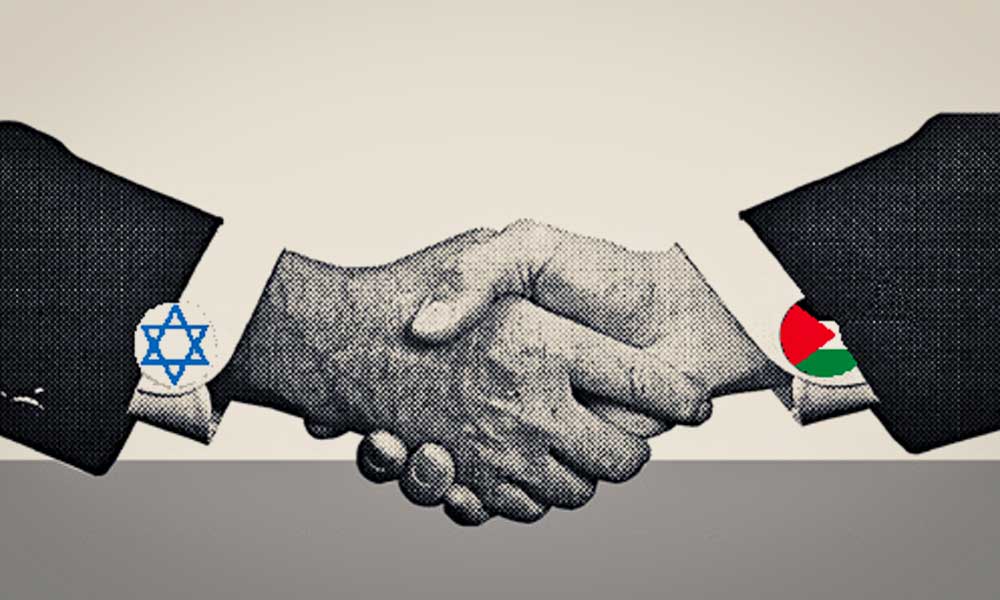Opinion | A ‘Confederation’ For Israel?
An old alternative to a two-state solution is gaining steam.

Hope swelled in many hearts when President Biden indicated he would deep-six the prior administration’s “Deal of the Century,” which would have enshrined Israel’s creeping annexation and ever-expanding settlement project and forced Palestinians to accept a state with as much contiguity as the Caribbean islands. With that off the table, the question is: What next?
Oslo is long dead. The “peace process” is moribund, the two-state solution on life support, its last breaths respirated by rhetorical bloviations. Israel’s strategy of “managing the conflict” is both deplorable and immoral, since “managing” requires a two-tiered justice system, denial of Palestinians’ rights, restrictions on their mobility, daily assaults on their dignity, checkpoints, preventive detention, home demolitions, evictions and the Israel Defense Forces’ blind eye toward settler violence. Reference to “apartheid”—once unmentionable, then flagged as a dreaded possibility, now an objective reality—has entered common parlance.
On January 12, the Israeli human rights organization B’Tselem published “This Is Apartheid,” a comprehensive report that documents “a regime of Jewish supremacy from the Jordan River to the Mediterranean Sea.” With no resolution of the conflict in sight, the Jewish state is fast becoming a one-state reality and a pariah nation. Yet change is in the air, and it’s called confederation.
Although not new, the idea that the two peoples might share one land with two independent but interdependent states, with demarcated but open borders, has gained fresh currency. Just in the past year, the progressive think tank The Century Foundation released “The Confederation Alternative for Israel and Palestine,” by Dahlia Scheindlin, which I commend as a user-friendly primer on this intriguing model for Israeli-Palestinian coexistence. The Brookings Doha Center published a 50-page paper entitled “The ‘State-Plus’ Framework: A Confederal Solution for Israel-Palestine,” in which visiting fellow Omar Rahman describes in granular detail how such a model might resolve a host of knotty issues: governance (where in concert, where separate), foreign relations, citizenship (as opposed to permanent residence), refugees, settlers, the status of Jerusalem and how to guarantee security for both peoples. (To his credit, Rahman also provides an objective assessment of the plan’s weaknesses.) In January, Bishara A. Bahbah, former associate director of Harvard’s Middle East Institute and editor-in-chief of al-Fajr in Jerusalem, lit up the blogosphere with his forthright assertion that “a confederation between Israel and Palestine can resolve the conflict.”
On February 12, confederation entered the mainstream when Bernard Avishai, an American-Israeli professor who lives in Jerusalem part of the year, and Sam Bahour, an American-Palestinian businessman who lives on the West Bank, coauthored a New York Times op-ed, “Want Israeli-Palestinian Peace? Try Confederation.” Focusing on the economic advantages of two states in confederation rather than rigidly separate, the authors highlight the benefits of a new “business ecosystem,” a common market, integrated supply chains, cross-border investment and each state’s right to “cultural development, its own passport, its own special ties with people outside the state—a place in the sun.” Two days later, Al Ghad Al Arabi televised an hour-long Zoom panel discussion based on the Times op-ed, a remarkable programming choice for a pan-Arab news channel.
In the midst of this groundswell, I discovered an NGO, Eretz L’kulam (A Land for All), comprised of Israelis and Palestinians who have taken it upon themselves to mobilize a pro-confederation movement by amplifying, to both populations, the vision, framework and feasibility of that option. Their efforts have inspired an ad hoc group of American-Jewish scholars, rabbis, philanthropists, writers and activists like myself to start organizing a U.S. support group, ideally in concert with Arab Americans.
Sounds impossible. But so did the idea, before it materialized, that Egyptian President Anwar Sadat would come to Jerusalem and address the Knesset, that Israeli Prime Minister Menachem Begin, former head of a pre-state underground paramilitary organization, would give the Sinai back to Egypt, and the two nations would sign a peace treaty that’s never been violated. Thirty years ago, you’d have been delusional to forecast that the crusty Israeli war hero, Yitzhak Rabin, would shake the hands of two storied enemies of the Zionist enterprise—Yasser Arafat and King Hussein of Jordan. And you’d have qualified for the loony bin had you predicted in 2012, after Barack Obama’s reelection, that four years later he’d be succeeded by a reality show host who in 2020 would convince four Arab League countries to normalize relations with the Jewish state.
Those wildly counterintuitive historical events prove that pie in the sky sometimes falls to earth on one’s dessert plate. It’s not America’s place to impose a solution on the parties to the Israeli-Palestinian conflict. But our government can play a constructive, evenhanded role, not with high-minded statements or high-level photo ops but with open minds and quiet back-channel diplomacy. Meanwhile, the rest of us need to get ourselves up to speed on creative solutions like confederation.
Letty Cottin Pogrebin is currently at work on her twelfth book, Shanda: A Memoir of Shame, Guilt, and Secrecy.


7 thoughts on “Opinion | A ‘Confederation’ For Israel?”
Confederation or whatever you would like to call it cannot work as long as the Palestinian leadership and radical factions want the destruction of Israel. It took two generations, 40 years, of wondering in the desert before the Jews were allowed to populate the land of ISrael. It too that long for the physical memory of slavery and a repressive life in Egypt to be erased from practice. A who;e new way of life had to be learned. A life of freedom, a life that was not tarnished either by slavery or the pagan practices of Egypt. Similarly it will take the equivalent of two generations, 40 years, once the Palestinians accept that Israel will not go away. 40 years of new textbooks, TV cartoons and kiddy shows. movies and songs that don’t teach negativity toward Israel. That don’t teach that refugees will return to their homes in Israel and that the generation that fled during the ’48 War has died off.
No amount of liberal wishful thinking will change reality. It is indeed unfortunate that the Palestinian’s leadership has rejected the opportunity to have a country of their own so many times. Besides, the Palestinians have to unite for PEACE. Hamas and the Islamists in Gaza will have to change as well. What is the problem with people who cannot read facts that stare them in the face.
The problem, sir, is that God is not in their equation. That fact changes everything!
No one in history has fought and died to live next door to Jews. The Palestinians/Arabs want all the land and without the Jews. Want proof? The PA bans land sales to Jews and punishes with death those who do it. Also, the PA does not want any Jews on its “land.”
Progrebin must be smoking some of the better hashish in the region to believe that the Jews would be willing to volunteer to give up sovereignty just on the basis of thin thoughts and lovely ideas. I would believe her more if she had actually served in the IDF, spoke Hebrew and lived in the country. Otherwise, she sits comfortably in America eating her Zabar bagel and lox with the Sunday NY Slimes and cursing the Jews who don’t do what she wants.
Excellent reply. Completely agree!
Letty Cottin Pogrebin mentions one of two “one-state solutions” that gained momentum in recent months. One, however, should not confuse a “confederation” of two autonomous peoples living side-by-side on terms of socio-economic and political parity with our accustomed American-style democracy that does not inherently or necessarily take into account Jewish autonomy which operated in a variety of political forms and settings for about two millennia. In fact, since Zionism was the natural outgrowth of this versatile pre-modern communitarianism when neither empires (minority rule) nor nation-states (majority rule) provided protection, it should not surprise anyone the “confederation” idea was vigorously debated by leading Zionists, the majority of whom had seriously entertained the idea at least once, either on principle or out of practical necessity, before the Cold War-induced Arab-Israeli conflict rendered it only a tad more inconsequential to the national aspirations of the Palestinian Arab refugees. But Pogrebin is not interested in elaborating on this “old [Zionist] alternative” (as the disingenuously inviting subtitle seems to suggest). Instead, she’d rather hubristically dismiss the “two-states solution” as intrinsically, inevitably, or incorrigibly leading to “Apartheid.” Yet, the sheer mention of “Apartheid” does not mysteriously make the two-states as “the least bad of the realistic possibilities” (Chomsky) disappear or miraculously turn the two opposing nations into a single multi-ethnic state nationality, effectively reducing collective identity to cuisine, commodity, and class. Without making this distinction clear, while ignoring history and only faulting Israel or Israelis for “Apartheid,” one may just as well fallaciously dismiss the entire “confederation” alternative as essentially amounting to the “separate, but equal” backdoor to racial discrimination, a la the specter-like legacy of the American Confederacy. It is simply an irresponsible way to promote any sort of mutual recognition, cooperation, or even peace.
My unpublished Letter to the Editor
Title: The Irresponsibility of Our Intellectuals
In “A Confederation for Israel? An Old Alternative to a Two-State Solution is Gaining Steam,” Letty Cottin Pogrebin mentions one of two “one-state solutions” that gained momentum in recent months. One, however, should not confuse a “confederation” of two autonomous peoples living side-by-side on terms of socio-economic and political parity with our accustomed American-style democracy that does not inherently or necessarily take into account Jewish autonomy which operated in a variety of political forms and settings for about two millennia. In fact, since Zionism was the natural outgrowth of this versatile pre-modern communitarianism when neither empires (minority rule) nor nation-states (majority rule) provided protection, it should not surprise anyone the “confederation” idea was vigorously debated by leading Zionists, the majority of whom had seriously entertained the idea at least once, either on principle or out of practical necessity, before the Cold War-induced Arab-Israeli conflict rendered it only a tad more inconsequential to the national aspirations of the Palestinian Arab refugees. But Pogrebin is not interested in elaborating on this “old [Zionist] alternative” (as the disingenuously inviting subtitle seems to suggest). Instead, she’d rather hubristically dismiss the “two-states solution” as intrinsically, inevitably, or incorrigibly leading to “Apartheid.” Yet, the sheer mention of “Apartheid” does not mysteriously make the two-states as “the least bad of the realistic possibilities” (Chomsky) disappear or miraculously turn the two opposing nations into a single multi-ethnic state nationality, effectively reducing collective identity to cuisine, commodity, and class. Without making this distinction clear, while ignoring history and only faulting Israel or Israelis for “Apartheid,” one may just as well fallaciously dismiss the entire “confederation” alternative as essentially amounting to the “separate, but equal” backdoor to racial discrimination, a la the specter-like legacy of the American Confederacy. It is simply an irresponsible way to promote any sort of mutual recognition, cooperation, or even peace.
Let’s make a real hybrid. Spanish as official language (to remember the alleged golden age of Andalusia even if it is just a myth), British laws, Kemalist or French-style secularism, German science (with no influence on food), a hippy culture (very Christian), and Kurdish style feminism. A Swiss-like confederation, a Tibetan care for peace and respect of the environment, and Jamaican medicine for all.